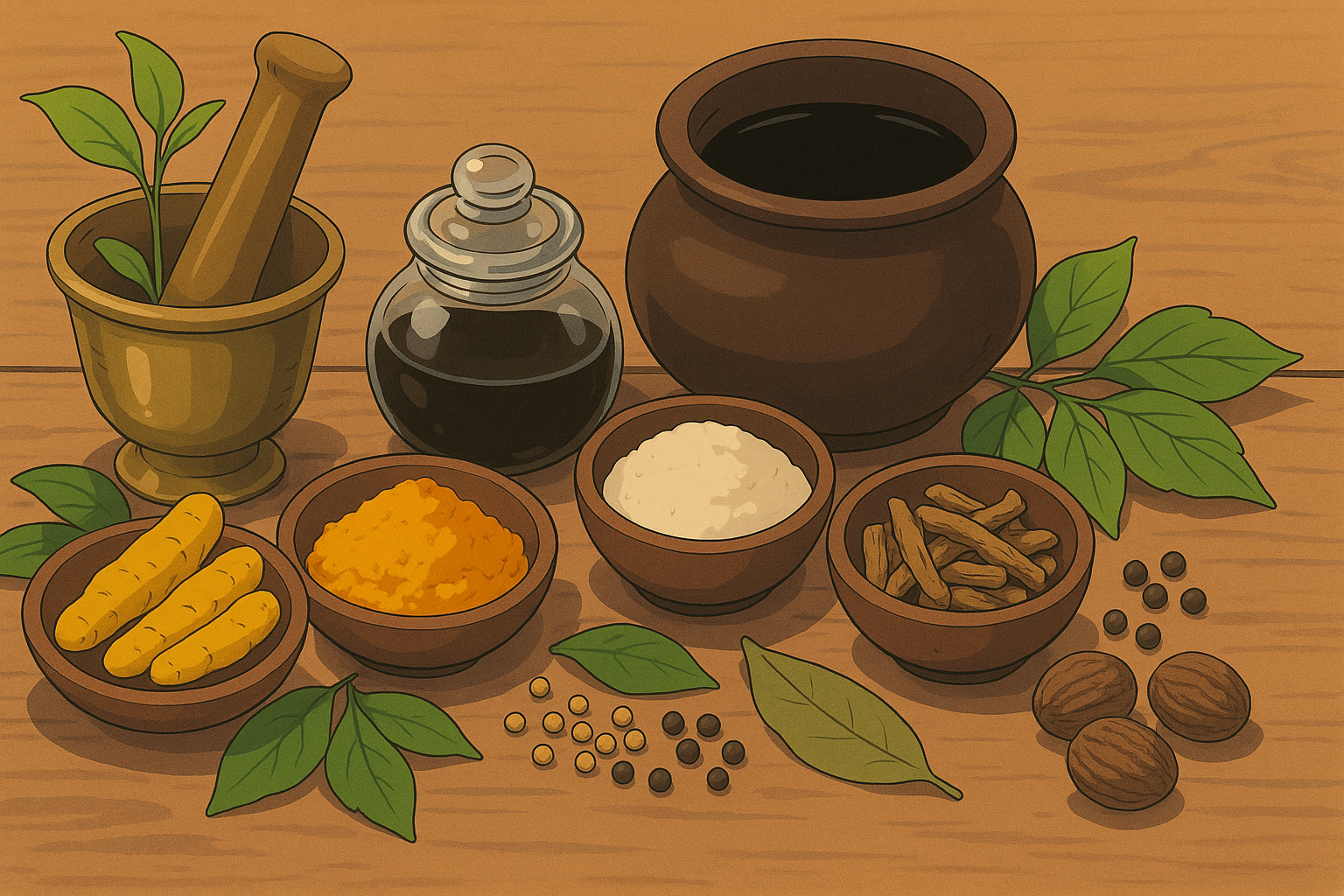
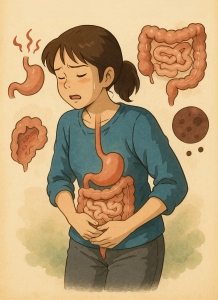 Diseases name :
Diseases name :
Gastrointestinal (GI) Disorders
What are the gastrointestinal disorders?
Gastrointestinal (GI) diseases encompass a range of conditions affecting the digestive system, including the esophagus, stomach, intestines, rectum, and associated organs. These disorders may be functional (e.g., IBS, dyspepsia) or structural (e.g., GERD, ulcers, diverticulosis). Inflammatory conditions like Crohn’s disease, ulcerative colitis, and celiac disease involve immune dysfunction, while infections (H. pylori, gastroenteritis) and cancers (colorectal, gastric) pose serious health risks.
Symptoms:
Ayurvedic Perspective on GI Diseases
Ayurveda links GI disorders to Agni (digestive fire) imbalance and Dosha disturbances, leading to toxin accumulation (Ama). Management includes:
Infertility –
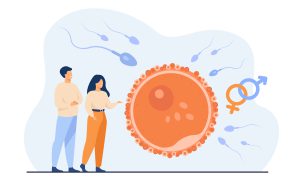
Infertility (Vandhyatva) is the inability to conceive despite regular unprotected intercourse for at least one year. Ayurveda attributes infertility to an imbalance in doshas (Vata, Pitta, Kapha), weak digestion (Agni), toxin accumulation (Ama), and improper functioning of reproductive tissues (Shukra Dhatu in men and Artava Dhatu in women).
Ayurvedic Perspective on Infertility
Ayurveda offers a comprehensive understanding of infertility, detailing its causes, symptoms, classifications, and management. According to classical Ayurvedic texts, successful conception depends on the presence and proper functioning of four essential factors:
Arthritis
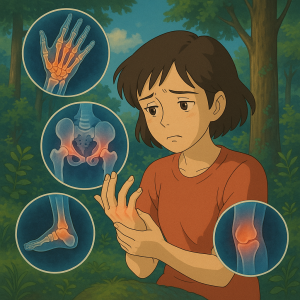
Arthritis is a condition that causes inflammation and pain in the joints. It can affect one or multiple joints and usually worsens with age. There are many types of arthritis, but the most common are:
Osteoarthritis (OA): A degenerative joint disease caused by wear and tear of cartilage, leading to pain, stiffness, and reduced mobility.
Rheumatoid Arthritis (RA): An autoimmune disorder where the immune system attacks the joint lining, causing inflammation, swelling, and eventual joint damage.
Gout: A type of arthritis caused by the buildup of uric acid crystals in the joints, leading to sudden and severe pain, often in the big toe.
Psoriatic Arthritis: A type of arthritis linked to psoriasis, an autoimmune skin condition.
Ankylosing Spondylitis: A form of arthritis that primarily affects the spine, causing inflammation and stiffness.
Symptoms of Arthritis
Ayurvedic Perspective on Arthritis
In Ayurveda, arthritis is often linked to an imbalance in Vata dosha, leading to conditions like Sandhigata Vata (Osteoarthritis) and Aamavata (Rheumatoid Arthritis). Treatment focuses on balancing doshas through diet, lifestyle, herbal remedies, and therapies like Panchakarma, Abhyanga (oil massage), Basti (medicated enema), and Swedana (steam therapy).
Skin Diseases
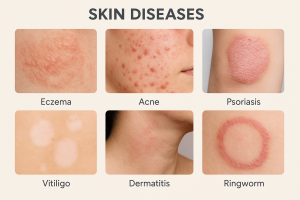
Skin diseases refer to a diverse range of dermatological conditions that primarily affect the skin, varying from mild irritations to severe infections and chronic disorders.
Causes:
Stress, Allergies, Infections, Autoimmunity, Genetic, Idiopathic, Environmental toxins
Common Symptoms of Skin Diseases
Ayurvedic Perspective on Skin Diseases
In Ayurveda, skin diseases are primarily associated with an imbalance in the three doshas—Vata, Pitta, and Kapha—which govern various physiological and pathological functions of the body. The skin, known as “Twacha”, is deeply connected to Rakta (blood), Mamsa (muscle tissue), and Rasa (plasma/lymph), and any disturbance in these elements can manifest as skin disorders.
Ayurveda treats skin diseases holistically by addressing the root cause rather than just symptoms. A combination of detoxification, herbal remedies, a balanced diet, and lifestyle modifications ensures long-term skin health and vitality. For personalized treatment, consultation with an Ayurvedic practitioner is recommended.
Obesity:
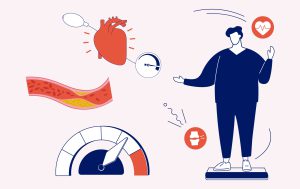
Obesity is a condition where a person becomes significantly overweight due to excessive fat accumulation under the skin. This leads to an increase in both the size and number of fat cells in the body.
How do I know if I am Obese?
A BMI > 30 is considered obese, and the waist-to-hip ratio is > 0.9 in Men and > 0.85 in Women, it’s considered as a marker for obesity. Other markers include high lipid levels in the blood and other measurements.
Ayurvedic Perspective on Obesity (Sthaulya) – Santarpan Janya Vikar
Ayurvedic View on Sustainable Weight Loss
Allergic Rhinitis/Asthma
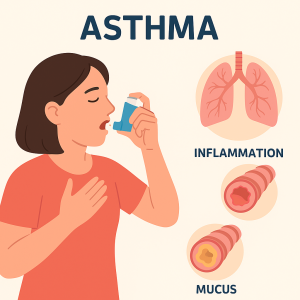
Allergic rhinitis and asthma are both allergic conditions that often coexist and are part of the “united airway disease” concept. They share common triggers and underlying inflammation.
Allergic Rhinitis
This is an allergic reaction to allergens like pollen, dust mites, mold, pet dander, or environmental irritants.
Symptoms:
Sneezing
Nasal congestion or runny nose
Itchy nose, eyes, throat, and ears
Postnasal drip
Sinus pressure or headaches
Ayurvedic Perspective on Allergic Rhinitis & Asthma
Both allergic rhinitis and asthma are caused by an imbalance of Vata and Kapha doshas along with weak digestion (Agni) Leads to Ama doshas, Ayurveda focuses on strengthening the Agni, immune system, reducing inflammation, and removing toxins (Ama) from the body.
Combined Treatment of panchakarma, shaman chikitsha, and ahar (pathyapalan) helps to overcome the diseases.
Migraine
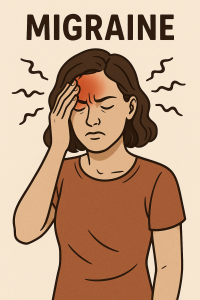
Migraine is a neurological condition that causes recurring headaches, usually on one side of the head. It is often accompanied by nausea, vomiting, and sensitivity to light and sound. The pain can be throbbing or pulsating and may last for hours or even days.
Common Triggers of Migraine
Stress and anxiety
Lack of sleep or irregular sleep patterns
Hormonal changes (especially in women)
Certain foods (chocolate, cheese, caffeine, alcohol)
Strong smells, loud noises, or bright lights
Weather changes
Ayurvedic Perspective on Migraine
In Ayurveda, migraines are often linked to an imbalance in Vata and Pitta doshas. The root causes include poor digestion (Ama accumulation), stress, and improper lifestyle, Panchakarma treatments along with shaman chikitsha helps to treat from root.
Diabetes

Diabetes is a metabolic disorder where the body either does not produce enough insulin or cannot effectively use the insulin it produces. This leads to high blood sugar levels, which can cause long-term complications.
Types of Diabetes
Type 1 Diabetes: Autoimmune condition where the pancreas produces little to no insulin.
Type 2 Diabetes: The body becomes resistant to insulin or does not produce enough insulin.
Gestational Diabetes: Occurs during pregnancy and usually resolves after childbirth.
Ayurvedic Perspective on Diabetes
According to Ayurveda, diabetes is caused by an imbalance in Kapha dosha as well med dhatu dusthi, along with weak digestion (Agni), It is often linked to an unhealthy lifestyle, excessive sugar intake, stress, and lack of physical activity.
We offer customized herbal formulations, Panchakarma therapies, and diet plans based on your body for Reverse Your Diabetes.